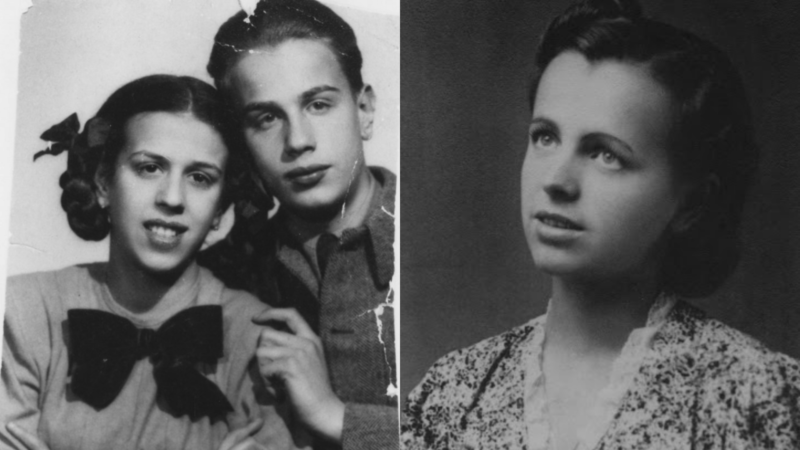
Erzsebet Fajo was a brave young babysitter who saved the lives of her employers – a family of four – during the Nazi occupation of Hungary in 1944.
Erzsebet Fajo was a Slovakian girl from a poor family who emigrated to Hungary by herself at age 13 to work as a nanny. She found employment with the Abonyis, a Jewish family in the small town of Bekescsaba. Parents Laszlo and Margit treasured Erzsebet as a member of the family, and she became like a big sister to their two children, Zsuzsanna and Ivan.
In 1941, the family moved to Budapest because of anti-Jewish persecution in Bekescsaba, and of course Erzsebet went with them. Despite the violent turmoil engulfing Europe, life in Hungary was relatively normal for the Abonyi family. Hungarian President Miklos Horthy had an alliance with Hitler’s Germany, but was reluctant to enforce Nazi decrees against the Jews. That reluctance, plus Horthy’s secret attempts to strike a deal with the Allies, led Germany to invade Hungary in March 1944.
The country was now run by the pro-Nazi Arrow Cross party and the situation for Hungary’s Jews got very bad very quickly. All Jews from the moment of birth were required to wear a yellow star prominently displayed on their clothing. Erzsebet, who felt like a member of the Abonyi family, wanted to wear a star too even though she wasn’t Jewish. Instead, they sadly told her she’d have to leave their employment to save her own life – non-Jews weren’t allowed to work for Jews. The Abonyis knew their days were numbered. Ten year old Zsuzsanna tried to convince her parents to commit suicide rather than be separated and murdered. Of course they refused to consider such a drastic act and tried everything to get out of Hungary but they were trapped.
At that point, young Erzsebet stepped up to become the family’s savior. Zsuzsanna remembered, “How (could) she save (us)? She didn’t have any money. She didn’t have an independent life… It (was) very sweet, but it (had) no validity. But I was wrong to think that. When the siege of Budapest started (and) virtually every home was ruined and bombed down, she was in the streets trying to get false papers.”
Erzsebet visited the Abonyis every day, bringing them food as well as medicine and other essential goods. She took all their valuables and brought them to an aunt so they wouldn’t be plundered by the Nazis.
On October 15, 1944 Laszlo Abonyi was arrested at his home and taken to a deportation center, where he awaited transport to a brutal Nazi slave labor camp.
Determined to save him, Erzsebet boldly approached the Red Cross and somehow obtained a letter of protection that she used to get Laszlo released. She knew the Abonyis were not safe in their home, and not sure what to do she pleaded with a local priest for assistance and advice. He helped her get letters from the Vatican which made the family eligible to take shelter in a building in Budapest owned by the Apostolic Nuncio. The Abonyis sheltered there for a few weeks, until the facility was attacked by the Arrow Cross. Storm troopers forced all the Jews outside and prepared to shoot them on the banks of the Danube river. Somehow, in the chaos, Erzsebet helped all four Abonyis escape.
For the next two months, Erzsebet found hiding places for the Abonyis and obtained forged papers for them. She continued visiting each member of the family every day, even though they were all in different parts of Budapest. Finally Erzsebet found safe shelter for the family in a “White Cross Hospital” – an apartment building packed with bunk beds where families targeted by the Nazis were hiding out.
Hungary was liberated by the Soviet Union in January 1945 and the Abonyis were able to return to their apartment. After the war they legally adopted Erzsebet, making it official that she was a member of the Abonyi family. They sent her to school so she could get a good education, and left her a third of their estate. Zsuzsanna and her husband left Hungary following the failed revolution of 1956 and moved to the United States, where Zsuzsanna became a respected writer, professor and founder of the Holocaust Studies Program at the University of Texas. She maintained a close correspondence with her adopted sister until Erzsebet’s death in 1995.
Erzsebet Fajo was honored as Righteous Among the Nations by Israeli Holocaust Memorial Yad Vashem in 1986. In her testimony, Zsuzsanna said, “Driven by the desire to save us, Erzsi defied the Germans. She saved us from death, saved my brother and me from becoming orphans and my parents from the worst anguish that can befall people – the loss of their children. It was her strength and heroism that gave us life, allowed us to grow up and eventually have children of our own.”
For her astonishing bravery in saving the life of an entire family, we honor Erzsebet Fajo as this week’s Thursday Hero.
Get the best of Accidental Talmudist in your inbox: sign up for our weekly newsletter.